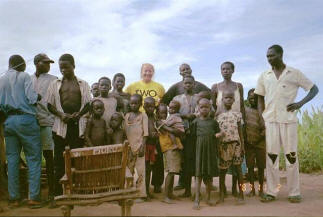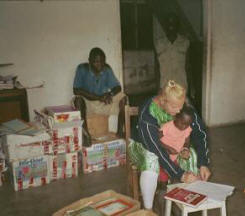
 IV Woman toils to feed the
book-starved in South Sudan IV Woman toils to feed the
book-starved in South Sudan
By Barbara Hahn
of the Grants Pass Daily Courier
Boxes of new and used books crowd the floor
of Christina Henning's Illinois Valley
home. "What's amazing is that these are
going from Cave Junction to the south of
Sudan," says Henning, who organized a book
drive among her Illinois Valley friends to
help her Sudanese friends.
Henning has traveled extensively throughout
Africa, and earlier this year spent more
than a month in Ghana. She also has twice
traveled to Sudan, staying with locals on
her visits. Through her travels, Henning has
found that people in Third World countries
have little to read, let alone educational
books.
"People will buy any old newspaper that you
have to read. They'd buy your travel guide,"
she said. "Books are like gold."
In this country, though, unused books
abound. So she figured there had to be a way
to connect local books to those who needed
them. About three years ago, she began
soliciting volumes from friends and family
and began shipping them to Sudan as part of
an organized book drive in the country.
But she recently parted company with the
group when she learned that the books were
only going to the northern part of the
country.
"I always assumed that the books went to
those who needed them," she said. Politics,
she learned, determined the recipients.
Sudan is a divided country, Henning
explained. The northern region is dominated
by Muslims who control the country's
politics, while the south is inhabited by
minority Christians.
"I wanted them distributed evenly and then I
found out that the Islamic government closed
the Juba University (located in southern
Sudan)." The university was moved to the
northern city of Khartoum, she added, "so if
the southerners want to go to their own
university, they have to convert (to Islam).
Starving people educationally is just
another way of starving them."
But Henning says she doesn't care about the
politics. "I'm doing this for the children,"
she said. Henning, who is calling her effort
"Books without Borders," decided she'd
find her own way to get the books from to
the southern Sudanese town of Kajo Kaji,
which she targeted for her gift.
Friends from Sudan connected her with a
Catholic priest, the Rev. Taban Toro in
Uganda, who agreed to shepherd the boxes
along their journey.
First, though, Henning must get the books to
a Portland shipper, known as a forwarder.
Next week, she'll meet the forwarder's
representative who will take the books to
Portland, where they will be shrink-wrapped
and placed in a shipping container. Then it
will take more than 35 days for the ship to
reach Mombasa on the coast of Kenya. From
there, the books will be driven northwest
through Nairobi and Kampala and then north
and over the border into Sudan. She
estimates that it will cost about $600 for
shipping, money she has raised by soliciting
donations from friends.
Henning figures she has about 1,000 pounds
of books packed in a dozen apple boxes.
There are math textbooks, children's books,
science books and nursing texts, donated by
Henning's friends as well as purchased at
local book sales.
"It's not that we can't use novels, but
books are so expensive to ship," she
explained. That's why she has concentrated
her collection efforts on basic educational
materials.
While all the books are written in English,
that isn't a problem for the recipients,
Henning said. "Sudan was under British
control until the mid-1950s," she explained.
"There's between 500 and 600 different
tribal languages, so English is considered
the main language."
What will perhaps be more startling to the
recipients of the books, especially the
children's books, is that virtually everyone
depicted in them is Caucasian.
"These are kids who have never looked at a
book and here, all of the people in the books
are white," she said. "There really should
be books with people of different colors."


|

